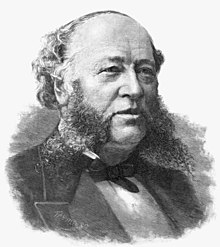William Henry Vanderbilt
| William Henry Vanderbilt | |
|---|---|
 |
|
| Born |
May 8, 1821 New Brunswick, New Jersey |
| Died | December 8, 1885 (aged 64) Manhattan, New York City, New York, U.S. |
| Resting place | Moravian Cemetery |
| Occupation | Owner of the New York Central Railroad and other railroads. |
| Net worth |
|
| Political party | Republican |
| Spouse(s) | Maria Louisa Kissam (m. 1841; his death 1885) |
| Children | Cornelius, Margaret, William, Emily, Florence, Frederick, Eliza, and George |
| Parent(s) |
Cornelius Vanderbilt Sophia Johnson |
| Relatives | See Vanderbilt family |
| Signature | |
William Henry "Billy" Vanderbilt (May 8, 1821 – December 8, 1885) was an American businessman and philanthropist. He was the eldest son of Commodore Cornelius Vanderbilt, an heir to his fortune and a prominent member of the Vanderbilt family. He was the richest American after he took over his father's fortune in 1877 until his own death in 1885, passing on a substantial part of the fortune to his wife and children, particularly to sons: Cornelius II and William. He inherited nearly $100 million from his father. The fortune had doubled when he died less than nine years later.
Billy was born in New Brunswick, New Jersey on May 8, 1821 to Cornelius Vanderbilt and Sophia Johnson.
His father Cornelius frequently berated and criticized him, calling his eldest son a "blockhead" and a "blatherskite". Billy longed to show his father that he was not, in fact, a blatherskite, but never dared stand up to the fearsome Commodore. A major turning point in their relationship occurred on the family trip to Europe on the steamship Vanderbilt in 1860, after which, the two became very close and Billy was given a greater role in business matters.
In 1841, Billy married Maria Louisa Kissam (1821–1896), daughter of Reverend Samuel Kissam and Margaret Hamilton Adams. They had eight children:
His father carefully oversaw his business training, starting him out at age 19 as a clerk in a New York banking house. After joining the executive of the Staten Island Railway, he was made its president in 1862 then three years later was appointed vice-president of the Hudson River railway.
In 1869, he was made vice-president of the New York Central and Hudson River Railroad, becoming its president in 1877. He took over for his father as president of the Lake Shore and Michigan Southern Railway, the Canada Southern Railway, and the Michigan Central Railroad at the time of the Commodore's death.
In 1883, reporter John Dickinson Sherman questioned him about why he ran the limited express train: "Do your limited express trains pay or do you run them for the accommodation of the public?" Vanderbilt responded with: "Accommodation of the public? The public be damned! We run them because we have to. They do not pay. We have tried again and again to get the different roads to give them up; but they will run them and, of course, as long as they run them we must do the same." The interview was then published in the Chicago Daily News, but Vanderbilt's words were modified. Several accounts of the incident were then disseminated; The accounts vary in terms of who conducted the interview, under what circumstance and what was actually said. William received bad publicity and clarified his response with a subsequent interview by the Chicago Times. In that interview he was quoted saying: "Railroads are not run for the public benefit, but to pay. Incidentally, we may benefit humanity, but the aim is to earn a dividend"
...
Wikipedia
